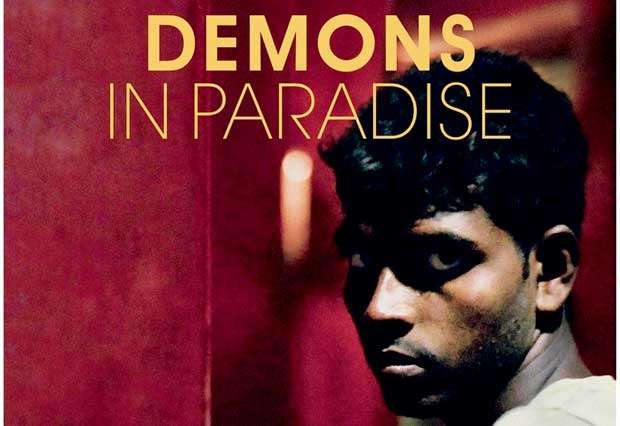Reply To:
Name - Reply Comment
Last Updated : 2024-05-11 03:39:00

The Jaffna International Cinema Festival, held earlier this month, lost considerable credibility, both as a film festival and as an event of international standing, following the controversial removal of Jude Ratnam’s courageous film, Demons in Paradise. Among many films that address ethnic violence and the armed conflict, this film is different because it critically interrogates the consequent brutal turn within Tamil militancy. The arbitrary removal of the film from the festival programme, and, worse still, the organisers’ vague and defensive messages, question the festival’s integrity and commitment to freedom of expression. 
No doubt under pressure from Tamil nationalist quarters, the removal of the film is characteristic of the continuing intolerance of dissent in Jaffna. Even the token criticisms of some Tamil nationalists merely focused on the incident’s impact on Jaffna’s international standing, in line with their broader engagement with international actors as saviours of Tamil victims. Having received international acclaim, Ratnam’s film ultimately seeks introspection from the Tamil community, and the denial of such a debate in Jaffna is unacceptable.
 A decade after the war, there have been many works on ethnic violence, the civil war, it’s devastating last phase and continuing trauma in the aftermath. There was initially a rush of works by foreign journalists capitalizing on Sri Lanka as a place of crisis. These works, for the most part, reified Tamil victim-hood. However, in recent years a few important works have appeared by literary figures and political activists, which deeply and critically contemplate on the tragic predicament facing the Tamil community. Among them, Ratnam’s film makes a critical intervention by opening up a conversation within the Tamil community about its past and future.
A decade after the war, there have been many works on ethnic violence, the civil war, it’s devastating last phase and continuing trauma in the aftermath. There was initially a rush of works by foreign journalists capitalizing on Sri Lanka as a place of crisis. These works, for the most part, reified Tamil victim-hood. However, in recent years a few important works have appeared by literary figures and political activists, which deeply and critically contemplate on the tragic predicament facing the Tamil community. Among them, Ratnam’s film makes a critical intervention by opening up a conversation within the Tamil community about its past and future.
"Demons in Paradise is a work of deep engagement in the spirit of The Broken Palmyrah, tracing the contradictions and struggles of generations of Tamils"
One gains a sense of James Joyce’s perspective that all great works of art are autobiographical. The film is narrated by Ratnam himself as he brings out the agony of his own struggle to come to terms with the war. Ratnam’s voice and the film’s flow dovetail with his journey in the shadow of an uncle who joined a small leftist Tamil militant group, the National Liberation Front of Tamil Eelam (NLFT). In following Ratnam’s personal journey and internal turmoil, the viewers are brought to engage their own tumultuous relationship to the war.
The film does not put forward any simple moral and logical explanations; for example, to the response of the Tamil community to LTTE’s massacre of the militants belonging to the Tamil Eelam Liberation Organization (TELO), or for that matter, the end of the war with the decimation of the LTTE and the massacre of civilians. Ratnam’s film, however, pushes its viewers to open their hearts and question their responsibility.
“It was now the end of an era. A struggle that had, in its dawn, been fired by several noble ideals, and called forth courage and much sacrifice from young persons irrespective of group, had now reached a point where the community was powerless and voiceless.
The Tigers’ history, their theoretical vacuum, lack of political creativity, intolerance and fanatical dedication will be the ultimate cause of their own break up. The legendary Tigers will go to their demise with their legends smeared with the blood and tears of victims of their own misdoings. A new Tiger will not emerge from their ashes. Only by breaking with this whole history and its dominant ideology, can a new liberating outlook be born.”
These were the words of the University Teachers for Human Rights (Jaffna) in The Broken Palmyrah, perhaps one of the most important works on the war, written three decades ago in a time of escalating violence. A deeply sympathetic concern for the youth who joined armed movements and the internal torture and internecine massacres are also a central theme in Ratnam’s film.
"It was now the end of an era. A struggle that had, in its dawn, been fired by several noble ideals, and called forth courage and much sacrifice from young persons irrespective of group, had now reached a point where the community was powerless and voiceless"
Sadly, the “end of an era” that the authors of The Broken Palmyrah saw three decades ago, has yet to find space for genuine reflection within the Tamil community. Ratnam’s project is one of prying open that space for discussion on the legacy of violence within. The powerless state of the  Tamil community continues to this day, and is as much a consequence of the devastation of war as it is the suppression of political alternatives to rebuilding a war-torn community.
Tamil community continues to this day, and is as much a consequence of the devastation of war as it is the suppression of political alternatives to rebuilding a war-torn community.
Demons in Paradise is a work of deep engagement in the spirit of The Broken Palmyrah, tracing the contradictions and struggles of generations of Tamils as they seek to come to terms with the protracted armed conflict. Some of them were older observers, others participants in armed struggle, and still others, like Ratnam, who from his childhood to the current moment is struggling to understand what went wrong and how the Tamil community might address its own vicious legacy.
Should not the Tamil community as a whole take some responsibility for the youth whose lives were cut short rather than hide behind the discourse of Tamil victim-hood? Is it not time to finally break with the dominant nationalist ideology and begin the search for a new political outlook?
Returning to the removal of Demons in Paradise from the film festival, how does one respond to such cowardly acts of silencing? Significantly, neither the film maker nor those who identify with Tamil dissent called for a boycott of the film festival. Indeed, the politics of boycott has become the curse of Tamil nationalist politics, a politics that is lazy to engage and struggle for alternative ways of moving forward.
On the opening day of the film festival, three leftist intellectuals participated in a panel discussion on a local TV station in Jaffna to debate the silencing of Demons in Paradise. Such critical engagement is what we need, rather than a boycott, which would likely have been the reaction of Jaffna’s crass Tamil nationalist lobby if the film had been screened as planned. Demons in Paradise is precisely trying to question such politics and kindle the conscience of a community that has been numbed by decades of Tamil nationalism and the LTTE’s totalitarian rule.
"The film is precisely trying to question such politics and kindle the conscience of a community that has been numbed by decades of Tamil nationalism and the LTTE’s totalitarian rule"
One of the most powerful scenes of Demons in Paradise is a fireside discussion among a number of ex-militants from the various Tamil militant movements, including the LTTE. Such critical reflection by a generation that was brutalized by war and saw tremendous losses is an important testament for collective responsibility. The fire for introspection should be kept alive rather than allowed to fizzle out through the silencing of dissent.
The path ahead for the Tamil community is necessarily linked to self-criticism. Those concerned about the future, including that of the younger generations, cannot leave it to the pomp of so-called international film festivals. Screening Demons in Paradise and organising public discussions and debates on such critical works in Jaffna is the need of the hour.

Add comment
Comments will be edited (grammar, spelling and slang) and authorized at the discretion of Daily Mirror online. The website also has the right not to publish selected comments.
Reply To:
Name - Reply Comment
US authorities are currently reviewing the manifest of every cargo aboard MV
On March 26, a couple arriving from Thailand was arrested with 88 live animal
According to villagers from Naula-Moragolla out of 105 families 80 can afford
Is the situation in Sri Lanka so grim that locals harbour hope that they coul